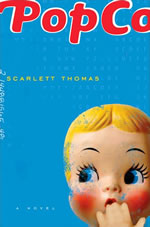 I think “The End of Mr. Y” (2007) is a classic. “PopCo” (2005) is not. Some may argue that plots do not necessarily require closure, protagonists do not necessarily be likeable. Having read “PopCo”, I can certainly see “The End of Mr. Y” a much improved version of “PopCo”. Even the writing style is much better in her latest novel. The similarity is haunting between the two. They both full of big intriguing ideas, split storyline, groups of people from different disciplines, and tons of puzzles.
I think “The End of Mr. Y” (2007) is a classic. “PopCo” (2005) is not. Some may argue that plots do not necessarily require closure, protagonists do not necessarily be likeable. Having read “PopCo”, I can certainly see “The End of Mr. Y” a much improved version of “PopCo”. Even the writing style is much better in her latest novel. The similarity is haunting between the two. They both full of big intriguing ideas, split storyline, groups of people from different disciplines, and tons of puzzles.
“PopCo”, like “The End of Mr. Y”, is split into two stories running in parallel – Alice’s present and her younger days living with her grandparents. The one puzzle that strings the two stories is a necklace given by her grandpa that contains a code that leads to some ancient pirate treasure. The big ideas circle around Cryptology, marketing, and anti-consumerism that, to me, are pretty dry topics to read. “PopCo” started right giving the readers hands-on education on how to apply codes to encrypt messages. It is without doubt a fun read trying to break the codes together with Alice. The corporate retreat, that turns out to be one long brainstorming seminar in creating an ultimate toy for teen girls, dominates the majority of the literature. If I was the editor, I would have trimmed that a fair bit and I would create a more satisfying closure. I personally love to read Alice’s childhood story. Unfortunately, that too ends too abruptly. The final breaking of the ultimate code has totally gone past me – or perhaps I read a bit too fast towards the end. So much for reading a puzzle book.
One interesting takeaway though is my deeper understanding on the teen girls. It was not at all obvious to me. Some of the highlights are as follows. Perhaps some of you can verify for me?
- Teen girls value motherhood a great deal. Many of their fantasies are connected to caring and responsibility (think soft toys).
- With regards to friendship, there is a need to care far more than a need to be cared for. A typical sentiment would be: I want to be there for my friends when they need me.
- Teen girls are non-competitive as a rule. In terms of priorities, girls from all cultures place friendship above all else.
- The word “sharing” is very important for girls. The word “winning” is hardly important.
- Of course girls do compete. But they never admit that they are engaged in competition. Girls try to refine their identities to further their more general aims: to have important social relationships and find a “perfect man”.
- Communication is of vast importance to teen girls. 79% of MSN Messenger users are girls. Closeness and telling secrets are important.
- SMS text messaging is the most popular way for the teen girls to keep in touch. Communicating using text in this way reinforces the need girls have to exchange messages perceived as ‘secret’.